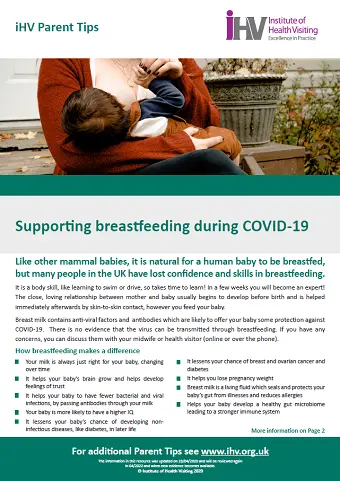As part of World Immunization Week 2020, our resources on childhood immunisations have been updated with the latest information and advice during the current COVID-19 pandemic – two Parent Tips and one Good Practice Points for Health Visitors.
The two updated Parent Tips:
- one providing some basic information on the childhood immunisation programme, explaining how vaccines work, how they are regulated and why it is important to ensure your baby receives all the recommended immunisations
- the second, provides answers to “Frequently Asked Questions” and has been written by leading national experts. It covers getting your baby immunised and what to expect, including information on things such as soothing your baby
during and after vaccinations, and what to do if they are poorly on the day of their appointment.
Just to reassure you that despite the current COVID-19 pandemic, it is still recommended that your child receives their vaccines as this protects them against other serious diseases that can still cause them harm.
These updated Parent Tips, together with those published last week and yesterday, can be found in our **Parenting Through Coronavirus (COVID-19)** webpage
The Good Practice Points for Health Visitors:
The immunisation programme is a key component of the Healthy Child Programme. It is important for health visitors to be aware of current research and practice to promote immunisation uptake and know where to go for information. Uptake of childhood vaccines in the UK is is generally high, although uptake of the MMR is a concern and the UK lost its ‘measles-free’ status last year. There are also concerns about the impact of the COVID-19 lockdown on immunisation uptake.
COVID-19 webpages
- For Health Visitors– This updated GPP is available in our GPP resource section of our website and can also be found on our COVID-19 (coronavirus) guidance for health visitors webpage – https://iHV.org.uk/COVID-19
- For parents and families– These updated Parent Tips are available in the Families Parent Tips section of our website as well as our Parenting through Coronavirus (COVID-19) webpage – https://iHV.org.uk/ParentingCOVID19
We have waivered our usual restrictions on resources for members and the COVID-19 sections of our website are “free access” to all to support the national response to this pandemic.













